- Browse
- R Programming
R Programming Courses Online
Master R programming for statistical computing and data analysis. Learn about R syntax, data manipulation, and visualization techniques.
Filter by
SubjectRequired *
LanguageRequired *
The language used throughout the course, in both instruction and assessments.
Learning ProductRequired *
LevelRequired *
DurationRequired *
SkillsRequired *
SubtitlesRequired *
EducatorRequired *
Explore the R Programming Course Catalog
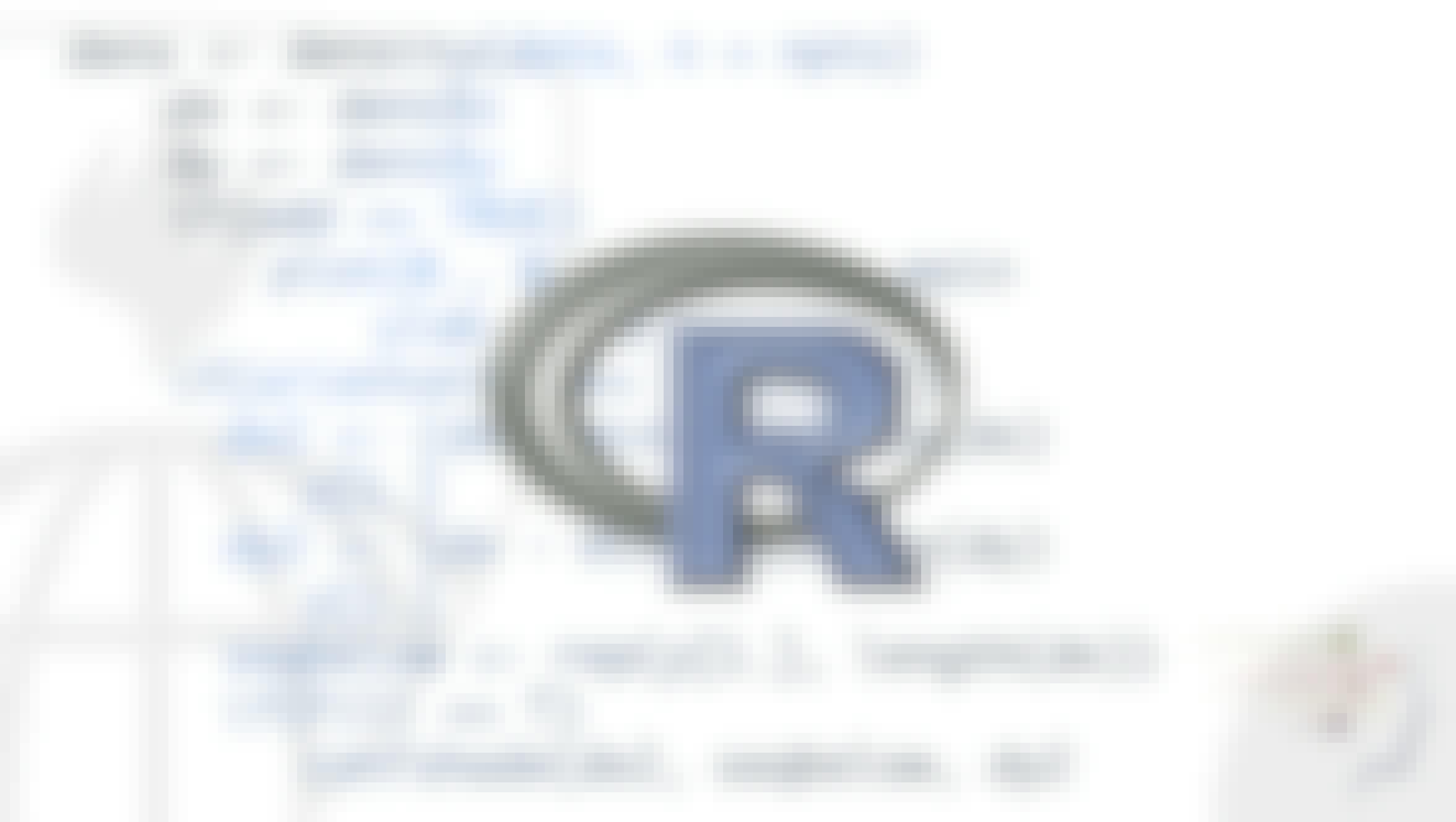 Status: Free TrialFree TrialJ
Status: Free TrialFree TrialJJohns Hopkins University
Skills you'll gain: Statistical Analysis, R Programming, Statistical Programming, Data Analysis, Debugging, Simulations, Computer Programming Tools, Program Development, Programming Principles, Data Structures, Performance Tuning, Data Import/Export
4.5·Rating, 4.5 out of 5 stars22K reviewsIntermediate · Course · 1 - 4 Weeks
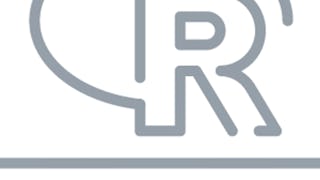 Status: Free TrialFree Trial
Status: Free TrialFree TrialSkills you'll gain: Rmarkdown, Ggplot2, R Programming, Data Visualization, Data Analysis, Tidyverse (R Package), Data Visualization Software, Statistical Programming, Data Cleansing, Data Manipulation, Programming Principles, Integrated Development Environments, Data Structures
4.8·Rating, 4.8 out of 5 stars12K reviewsBeginner · Course · 1 - 3 Months
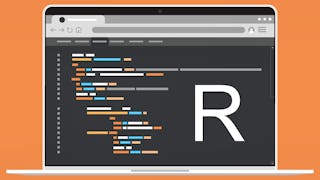 Status: Free TrialFree Trial
Status: Free TrialFree TrialSkills you'll gain: Data Manipulation, Web Scraping, R Programming, Data Analysis, Data Science, Data Structures, Data Import/Export, Exploratory Data Analysis, Programming Principles, Jupyter, Integrated Development Environments
4.5·Rating, 4.5 out of 5 stars584 reviewsBeginner · Course · 1 - 3 Months
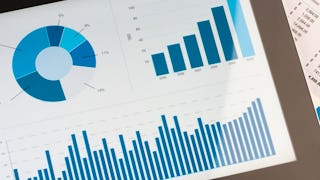 Status: NewNewStatus: PreviewPreviewM
Status: NewNewStatus: PreviewPreviewMMicrosoft
Skills you'll gain: Microsoft Visual Studio, Debugging, R Programming, Data Structures, Programming Principles, Statistical Programming, Development Environment, Data Manipulation, Integrated Development Environments, Data Transformation, Scripting Languages, Scripting, Software Installation
Beginner · Course · 1 - 4 Weeks
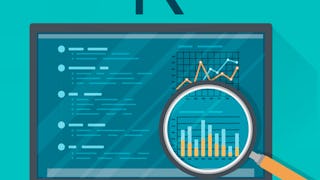 Status: Free TrialFree Trial
Status: Free TrialFree TrialSkills you'll gain: Data Wrangling, Exploratory Data Analysis, Data Analysis, R Programming, Data Manipulation, Data Visualization, Predictive Analytics, Statistical Analysis, Data Science, Regression Analysis, Predictive Modeling, Statistical Modeling, Feature Engineering, Machine Learning Methods
4.7·Rating, 4.7 out of 5 stars342 reviewsIntermediate · Course · 1 - 3 Months
 Status: NewNewStatus: Free TrialFree TrialM
Status: NewNewStatus: Free TrialFree TrialMMicrosoft
Skills you'll gain: Rmarkdown, Version Control, Web Scraping, Regression Analysis, Knitr, Exploratory Data Analysis, Statistical Analysis, Data Manipulation, Dimensionality Reduction, Ggplot2, Geospatial Information and Technology, Time Series Analysis and Forecasting, Plotly, Shiny (R Package), Data Cleansing, Data Visualization, Data Wrangling, Software Documentation, R Programming, Microsoft Copilot
4.5·Rating, 4.5 out of 5 stars6 reviewsBeginner · Professional Certificate · 3 - 6 Months
What brings you to Coursera today?
 Status: Free TrialFree TrialJ
Status: Free TrialFree TrialJJohns Hopkins University
Skills you'll gain: Rmarkdown, Exploratory Data Analysis, Version Control, Statistical Analysis, R Programming, Data Manipulation, Data Cleansing, Data Science, Data Wrangling, Plot (Graphics), Statistical Programming, Statistical Visualization, Ggplot2, R (Software), Dimensionality Reduction, Data Visualization Software, Knitr, Data Sharing, GitHub, Machine Learning
4.6·Rating, 4.6 out of 5 stars48K reviewsBeginner · Specialization · 3 - 6 Months
 Status: Free TrialFree TrialD
Status: Free TrialFree TrialDDuke University
Skills you'll gain: Bayesian Statistics, Statistical Hypothesis Testing, Sampling (Statistics), Statistical Inference, Exploratory Data Analysis, Peer Review, Regression Analysis, R (Software), Statistical Reporting, Probability Distribution, Statistical Methods, Statistics, Statistical Analysis, Data Analysis, Probability & Statistics, Probability, R Programming, Statistical Modeling, Correlation Analysis, Data Visualization
4.7·Rating, 4.7 out of 5 stars7.6K reviewsBeginner · Specialization · 3 - 6 Months
 Status: Free TrialFree TrialU
Status: Free TrialFree TrialUUniversity of Colorado Boulder
Skills you'll gain: Tidyverse (R Package), Rmarkdown, R Programming, Ggplot2, Data Import/Export, Data Visualization, Statistical Visualization, Data Manipulation, Data Visualization Software, Data Analysis, Data Science, Data Storytelling, Statistical Analysis, Relational Databases, Data Cleansing, Data Transformation, Statistical Programming, Data Integration, Data Wrangling, Communication
4.1·Rating, 4.1 out of 5 stars54 reviewsBeginner · Specialization · 1 - 3 Months
 Status: Free TrialFree Trial
Status: Free TrialFree TrialSkills you'll gain: Data Storytelling, Interactive Data Visualization, Data Visualization Software, Database Design, Shiny (R Package), Data Visualization, Data Wrangling, Dashboard, Exploratory Data Analysis, Relational Databases, Data Analysis, Ggplot2, Data Presentation, SQL, Plot (Graphics), Databases, Leaflet (Software), Data Manipulation, Web Scraping, R Programming
4.5·Rating, 4.5 out of 5 stars1.2K reviewsBeginner · Specialization · 3 - 6 Months
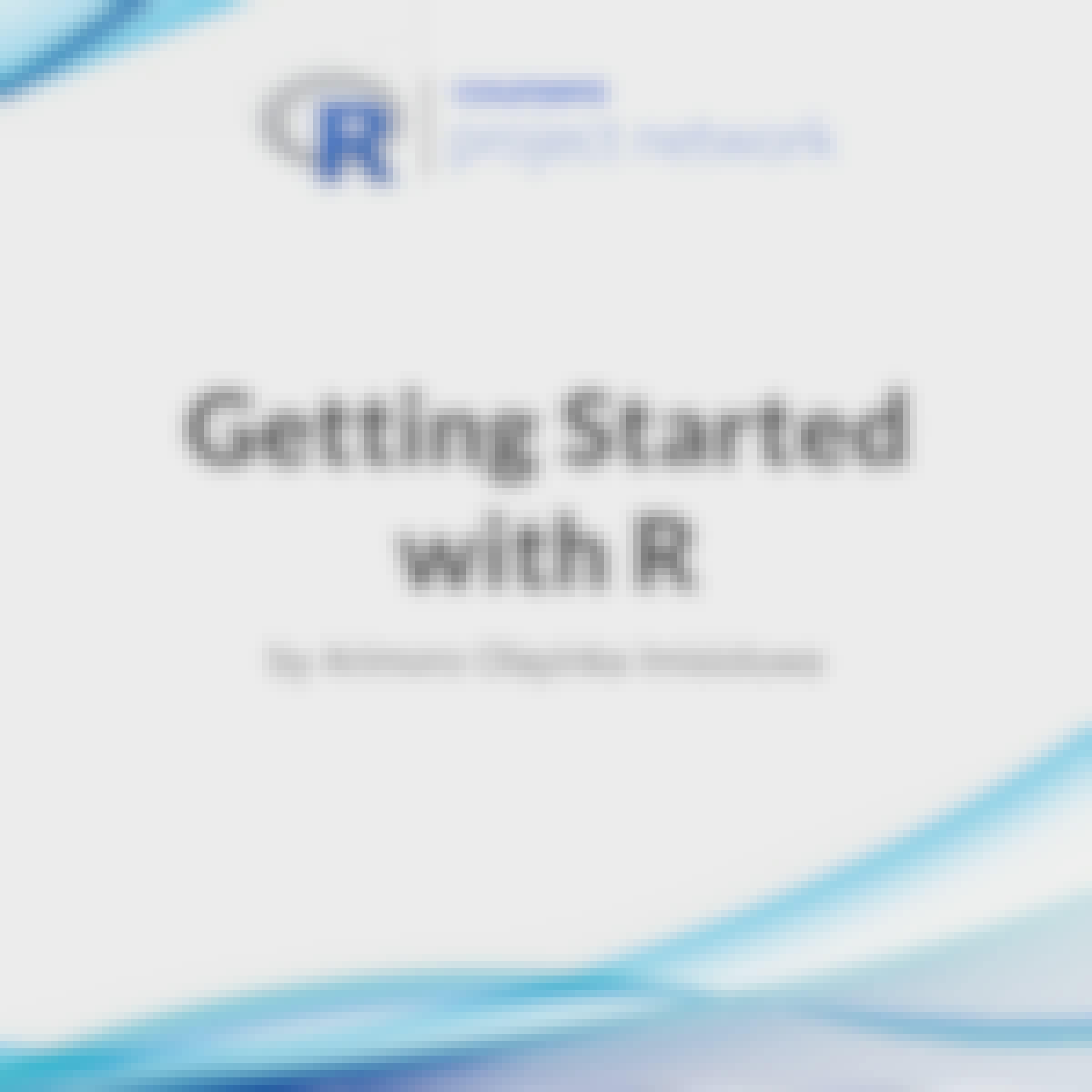 C
CCoursera
Skills you'll gain: R (Software), Data Import/Export, Package and Software Management, R Programming, Data Structures, Data-oriented programming, Statistical Programming, Data Analysis Software, Data Analysis, Data Science
4.3·Rating, 4.3 out of 5 stars383 reviewsBeginner · Guided Project · Less Than 2 Hours
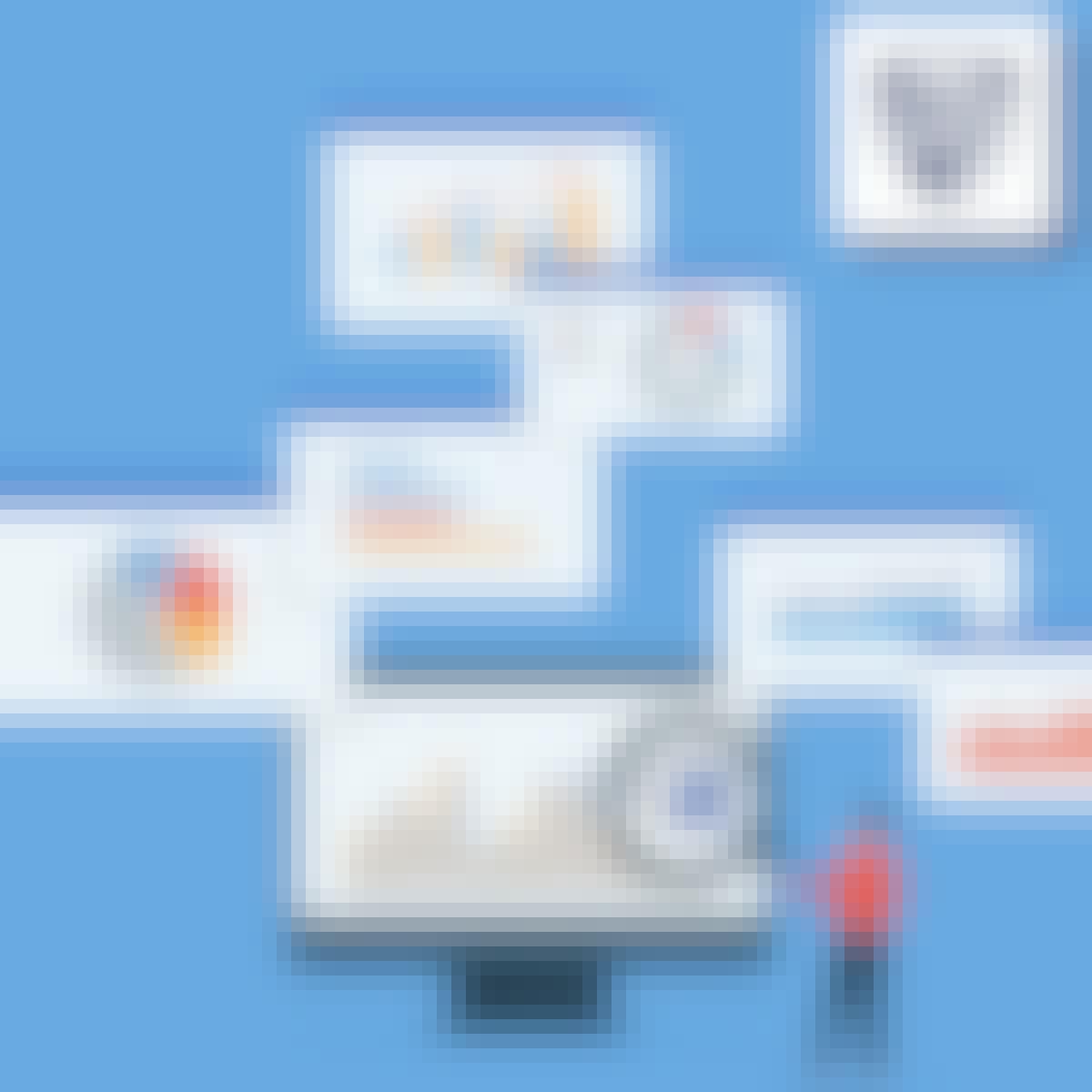 Status: Free TrialFree TrialJ
Status: Free TrialFree TrialJJohns Hopkins University
Skills you'll gain: Rmarkdown, Shiny (R Package), Ggplot2, Tidyverse (R Package), Data Visualization, Spatial Data Analysis, Statistical Visualization, Scatter Plots, Plot (Graphics), Dashboard, Data Import/Export, Interactive Data Visualization, R Programming, Data Visualization Software, Geospatial Information and Technology, Data Literacy, Statistical Reporting, Data Manipulation, Data Science, Data Analysis
4.8·Rating, 4.8 out of 5 stars441 reviewsBeginner · Specialization · 3 - 6 Months
R Programming learners also search
In summary, here are 10 of our most popular r programming courses
- R Programming: Johns Hopkins University
- Data Analysis with R Programming: Google
- Introduction to R Programming for Data Science: IBM
- The R Programming Starter Course: Microsoft
- Data Analysis with R: IBM
- Microsoft R Programming for Everyone: Microsoft
- Data Science: Foundations using R: Johns Hopkins University
- Data Analysis with R: Duke University
- Expressway to Data Science: R Programming and Tidyverse: University of Colorado Boulder
- Applied Data Science with R: IBM
Frequently Asked Questions about R Programming
R programming is the use of the R computer language for statistical analysis and graphic presentation. R is commonly used in business and research computing environments to analyze and visualize data, then create reports that can be used for decision making. R programming is increasingly more important given the expansion of big data for analysis.
It's important to learn R programming if you want to be able to build computer programs that wrangle data and convert it into usable information. Organizations often have large amounts of data but are unable to understand what it means. Using programs written by R, you can generate Bayesian statistics and graphic analysis for business analytics, public health, and medical research, among other industries. Learning R is a component of learning data science, so another reason to study R programming is to get some of the fundamentals completed before venturing deeper into computer science studies.
Typical careers that use R programming are in business analytics, financial services, and medical research. It is also a skill used in many data science roles. R programming pulls out information from large sets of data, so any field that calls for statistical inference from big data needs competent R programmers to create the analytics and reports needed. Some experience with R programming is useful for people who will be managing programming teams or requesting reports made from programs written in R. As big data analysis becomes more important in more fields, R programming becomes more valuable in the workplace.
Online courses can help you learn R programming by introducing the fundamentals of the language, teaching how it connects to such industries as finance and health care, and offering projects that let you show what you have learned. Courses are offered at all levels, from beginning to advanced. Many of them set you up for further work in data science or allow you to earn a specialization or certificate.
Online R Programming courses offer a convenient and flexible way to enhance your knowledge or learn new R Programming skills. Choose from a wide range of R Programming courses offered by top universities and industry leaders tailored to various skill levels.
When looking to enhance your workforce's skills in R Programming, it's crucial to select a course that aligns with their current abilities and learning objectives. Our Skills Dashboard is an invaluable tool for identifying skill gaps and choosing the most appropriate course for effective upskilling. For a comprehensive understanding of how our courses can benefit your employees, explore the enterprise solutions we offer. Discover more about our tailored programs at Coursera for Business here.










